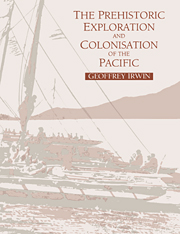Book contents
- Frontmatter
- Contents
- List of figures
- List of tables
- 1 An introduction to the Pacific and the theory of its settlement
- 2 Pleistocene voyaging and the settlement of Greater Australia and its Near Oceanic neighbours
- 3 Issues in Lapita studies and the background to Oceanic colonisation
- 4 Against, across and down the wind: a case for the systematic exploration of the remote Pacific
- 5 The colonisation of Eastern Melanesia, West Polynesia and Central East Polynesia
- 6 The colonisation of Hawaii, New Zealand and their neighbours
- 7 Issues in the colonisation of Micronesia
- 8 Voyaging by computer: experiments in the exploration of the remote Pacific Ocean
- 9 Voyaging after colonisation and the study of culture change
- 10 The rediscovery of Pacific exploration
- Bibliography
- Index
- Plate section
8 - Voyaging by computer: experiments in the exploration of the remote Pacific Ocean
Published online by Cambridge University Press: 26 January 2010
- Frontmatter
- Contents
- List of figures
- List of tables
- 1 An introduction to the Pacific and the theory of its settlement
- 2 Pleistocene voyaging and the settlement of Greater Australia and its Near Oceanic neighbours
- 3 Issues in Lapita studies and the background to Oceanic colonisation
- 4 Against, across and down the wind: a case for the systematic exploration of the remote Pacific
- 5 The colonisation of Eastern Melanesia, West Polynesia and Central East Polynesia
- 6 The colonisation of Hawaii, New Zealand and their neighbours
- 7 Issues in the colonisation of Micronesia
- 8 Voyaging by computer: experiments in the exploration of the remote Pacific Ocean
- 9 Voyaging after colonisation and the study of culture change
- 10 The rediscovery of Pacific exploration
- Bibliography
- Index
- Plate section
Summary
In previous chapters, a theory of Pacific voyaging and colonisation was proposed, which contained many elements. It emphasised rationality, in a cross-cultural sense, and assumed explorers understood their own world. It predicted, in a general way, the order in which island groups should be settled and variations in the time that this should take. Then it was measured against archaeological evidence and found to fit tolerably well. However, it remains just another story among others about Pacific colonisation, which have been accumulating for 200 years. Some further testing needs to be done to give it more weight. This chapter summarises the issues and describes a computer simulation undertaken to investigate them.
The first general aim of the simulation was to provide a second level of testing for theoretical propositions about colonisation, to review a host of more specific suggestions about the settlement of particular islands, and to look for possible solutions to current problems. One example was the brief preview of simulation included in the discussion of Micronesia. A second general aim was to use the simulation to try to learn more about the methods of prehistoric exploration and to suggest, specifically, how these might have become more refined during the 2000 or more years that Pacific colonisation continued.
Our starting position is that we know from many thousands of smallboat passages in modern and historical times, and from the evidence of prehistory, that a great many passages in the Pacific were possible. Therefore, we are unable to reject many out of hand. Instead, it needs to be shown that some propositions are more likely than others: that some passages probably required certain kinds of knowledge, which others did not.
- Type
- Chapter
- Information
- The Prehistoric Exploration and Colonisation of the Pacific , pp. 133 - 173Publisher: Cambridge University PressPrint publication year: 1992



